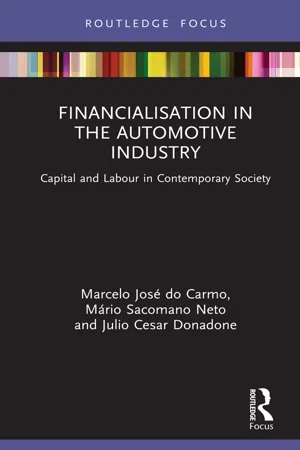
Financialisation in the Automotive Industry
Capital and Labour in Contemporary Society
Marcelo José do Carmo, Mário Sacomano Neto, Julio Cesar Donadone
- 142 páginas
- English
- ePUB (apto para móviles)
- Disponible en iOS y Android
Financialisation in the Automotive Industry
Capital and Labour in Contemporary Society
Marcelo José do Carmo, Mário Sacomano Neto, Julio Cesar Donadone
Información del libro
Where presidents or members of affluent families were previously seen, it is increasingly the case that car manufacturers are owned by banks and investment funds which have taken control of the entire economic life of these firms. This has significant impact on the terms of employment and layoffs, wages and precarious work, growing inequalities in income strata, compensation levels for executives, and the implementation of short-termist strategies across business operations.
This book explores this increasing financialisation – the predominance of the financial sector over the productive sector – in the automotive industry. In particular it is shown that the financial operations of these companies through leasing, insurance, loans and other financial instruments is now much more profitable than the manufacturing aspects of the business, which was originally the raison d'être for these fi rms. The chapters demonstrate how there are great demands to increase the return to shareholders as a main concern, despite other metrics and/ or other stakeholders. The work studies the impact of financialisation at the world's five largest automakers which together represent almost 50% of car production, providing an exploratory analysis of profitability, shareholder composition, compensation to executives, workers' salaries, dividend payments to shareholders and employment.
Encouraging debate on contemporary economy, this book marks a significant addition to the literature on financialisation, contemporary forms of capitalism, labour and economic sociology more broadly.